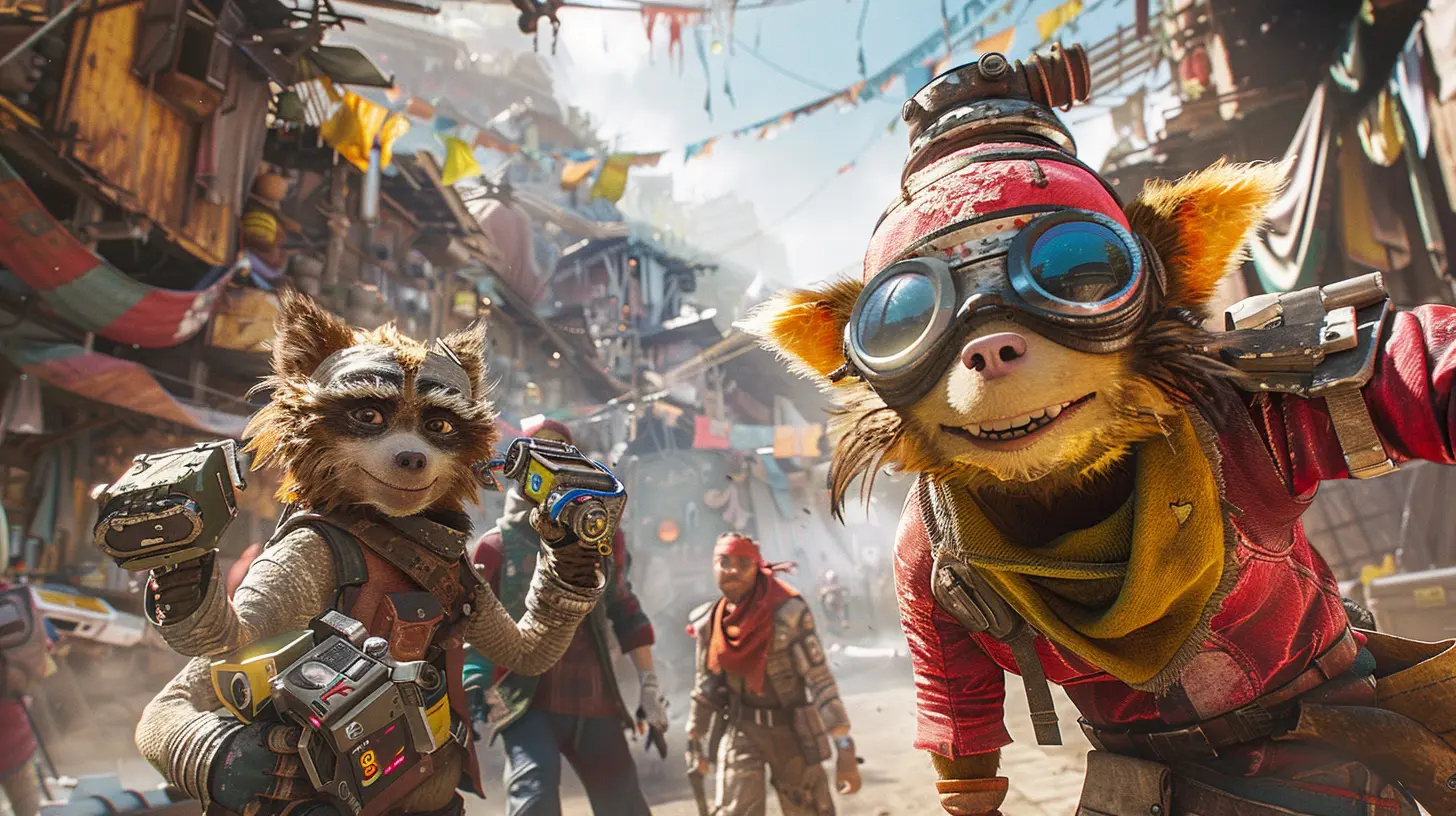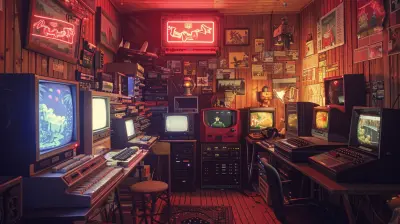The Most Controversial Microtransactions in Gaming History
12 April 2025
Microtransactions—just hearing the word might make some gamers roll their eyes or grit their teeth. Once upon a time, you’d buy a game, pop it into your console or PC, and play it to your heart’s content. But then, somewhere along the way, publishers decided that wasn’t enough. Enter microtransactions: love them or hate them, they’ve become a pillar of the gaming industry.
But not all microtransactions are created equal. Some have sparked outrage, triggered boycotts, and made headlines for all the wrong reasons. While gaming has seen its fair share of controversies, a handful of egregious examples stand out, forever burned into the memories of frustrated players. So, grab a seat and let’s take a journey through the most controversial microtransactions in gaming history. Warning: this might just bring back some unpleasant flashbacks.
What Are Microtransactions, Anyway?
Before we dive into the rabbit hole of controversy, let’s break it down. Microtransactions are those little (or not-so-little) purchases players can make within a game. They might include cosmetic skins, weapons, DLC packs, or the ever-dreaded loot boxes. On paper, they’re meant to offer players optional content. But in practice? Oh boy, things get murky fast.Why so much hate? Well, for starters, some players argue that microtransactions often prioritize profits over gameplay. They can create a “pay-to-win” atmosphere, lock content behind a paywall, or transform what should be a rewarding gaming experience into a grindfest. Now let’s look at the biggest offenders in this realm.
1. “Pay to Win” in EA’s Star Wars: Battlefront II
Ah, Star Wars: Battlefront II—a game that had everything going for it… until it didn’t. When this game launched in 2017, fans were hyped. Who doesn’t want to wield a lightsaber or pilot an X-Wing? But shortly after release, the galaxy far, far away became a galaxy of frustration and anger.The issue? Locked characters (like Darth Vader and Luke Skywalker) and overpowered upgrades were hidden behind a loot box system. You could grind for these rewards (we’re talking 40 hours of gameplay for a single character), or you could cough up cold hard cash to skip the grind. Unsurprisingly, the gaming community wasn’t thrilled.
The backlash was massive, and EA’s now-infamous response to criticism—“the intent is to provide players with a sense of pride and accomplishment”—did little to calm the storm. In fact, it went on to become the most downvoted comment in Reddit history. Ouch. EA eventually reworked the progression system, but the fiasco remains one of the worst examples of microtransactions gone wrong.
2. The $100 Horse Armor in The Elder Scrolls IV: Oblivion
Let’s rewind to 2006, back when microtransactions were still a relatively new concept. Enter Bethesda, one of the pioneers of paid DLC… though perhaps not in the way they’d hoped.In The Elder Scrolls IV: Oblivion, Bethesda introduced horse armor as paid content. The idea? For the small price of $2.50, your trusty steed could wear shiny decorative armor. That’s it. No gameplay benefits, no added functionality—just a cosmetic upgrade.
To say this didn’t sit well with the gaming community would be an understatement. Many players felt it was absurd to pay real-world money for something so trivial. Over time, this infamous horse armor has become the gold standard for mocking overpriced DLC. And while other games have done worse since, this one earns its spot in gaming history as one of the first controversies of its kind.
3. Activision’s $1 Red Dot in Call of Duty: Modern Warfare Remastered
A red dot sight for $1. Yes, you read that right.When Call of Duty: Modern Warfare Remastered dropped in 2016, fans were excited to revisit one of the most beloved entries in the series. But then Activision decided to milk nostalgia for all it was worth. They introduced microtransactions for cosmetic items, including—you guessed it—a red dot sight for weapons.
On the surface, a buck for a red dot sight might not sound too bad. But keep in mind that the original game had no microtransactions. Many fans felt cheated, arguing that this was a blatant cash grab for something that should’ve been included in the base game.
The backlash to the nickel-and-dime approach was so loud that it reinforced the narrative that remasters should maintain the integrity of the originals. Lesson learned? For some companies, maybe not.
4. 2K Games and Unskippable Ads in NBA 2K21
Imagine paying $60 for a game and still being forced to watch ads. Sounds ridiculous, right? Well, tell that to NBA 2K21.In 2020, players of NBA 2K21 noticed something odd: unskippable in-game ads were popping up during loading screens. And these weren’t subtle—they were full-on commercials for products like Oculus headsets. What made it worse was that the ads were slotted into a full-priced game, not a free-to-play title where this sort of thing is more commonplace.
The backlash was swift, with gamers calling out 2K for shamelessly prioritizing ad revenue over player experience. While 2K eventually adjusted the ads, the damage was done. If there’s one thing gamers hate more than microtransactions, it’s invasive, unavoidable ads.
5. The FIFA Ultimate Team Loot Box Saga
If you’ve ever played any of EA’s FIFA games, you know that FIFA Ultimate Team (FUT) is a colossal moneymaker. But what’s lurking under the surface of its addictive appeal? Loot boxes.FUT allows players to build dream teams by collecting player cards. These cards can be earned in-game… or purchased through packs, which are essentially loot boxes. The catch? You don’t know who you’ll get. It’s a gamble, plain and simple.
Over the years, EA has found itself under fire for promoting gambling-like mechanics in games marketed toward younger audiences. Some countries, like Belgium, have outright banned these loot boxes, calling them a form of illegal gambling. While EA continues to defend the mechanic (and rake in billions), FUT remains one of the most polarizing examples of microtransactions ever.
6. Paying for Respawns in Metal Gear Survive
Let’s shift gears to Metal Gear Survive. After the legendary Hideo Kojima’s departure, Konami released this spin-off to lukewarm reception. But its biggest offense wasn’t the gameplay—it was the microtransactions.Players quickly discovered that the game charged money for additional save slots. Want to start a new character? That’ll be $10. Konami even went so far as to charge for in-game revival items, meaning you’d have to pay real money just to keep playing after a death in certain scenarios.
Predictably, this sparked outrage. Many players saw it as a slap in the face to fans of the Metal Gear franchise, tarnishing the legacy of one of gaming’s most revered series.
Why Do Microtransactions Keep Happening?
Here’s the million-dollar (literally) question: why do gaming companies keep pushing microtransactions when they seem to rile up so many players? The answer is simple—money. It’s a business, after all.Microtransactions rake in billions of dollars every year. Free-to-play games like Fortnite and Genshin Impact have proven that monetization models can be wildly successful when done right. But when companies push their luck and prioritize short-term profits over long-term goodwill, they gamble with their reputation.
Are Microtransactions Here to Stay?
Let’s be real: microtransactions aren’t going anywhere. They’re too lucrative for companies to abandon altogether. But the key lies in balance. Players are more willing to accept microtransactions if they’re fair, optional, and avoid disrupting the core gameplay.At the end of the day, it’s about trust. Gamers want to feel respected, not exploited. And as history has shown, when companies cross the line, players will push back—loudly.
Final Thoughts
Gaming has come a long way since the days of cartridges and discs, but not every innovation has been a welcome one. Microtransactions have the potential to enhance games in meaningful ways when handled responsibly, but when they’re abused? They can leave a bitter taste that’s hard to ignore.Whether it’s paying for horse armor, unlocking Darth Vader, or spinning the roulette wheel for loot boxes, these controversies are a reminder of what happens when gaming companies prioritize profits over players. Let’s just hope the future of gaming learns from these cautionary tales. Or, at the very least, let’s pray nobody tries to sell us a $5 save slot again.
all images in this post were generated using AI tools
Category:
MicrotransactionsAuthor:

Greyson McVeigh
Discussion
rate this article
5 comments
Thornefield Pratt
Microtransactions may divide us, but they spark crucial conversations about fairness and the future of gaming!
May 9, 2025 at 4:25 PM

Greyson McVeigh
Absolutely! Microtransactions ignite important debates on equity and the direction of gaming, reflecting our values as players.
Karen Sharpe
Great insights! Microtransactions really spark diverse opinions in gaming.
April 27, 2025 at 4:04 PM

Greyson McVeigh
Thank you! It's fascinating how microtransactions can evoke such strong reactions from the gaming community.
Colette McConnell
Microtransactions are the cancer killing gaming. They prioritize profit over player experience, exploiting wallets instead of creativity. Gamers deserve better than these shady tactics—it's time to demand fair practices and reclaim our passion for gaming!
April 20, 2025 at 2:34 AM

Greyson McVeigh
I appreciate your passion for this issue. Microtransactions can indeed impact player experience, and it's important for the gaming community to advocate for fairness and creativity in the industry.
Sable Wade
Microtransactions aren't just controversial; they're a plague on gaming. Developers prioritize profit over player experience, drowning creativity in greed. It's time we demand more respect for our investment and push back against these exploitative practices. Enough is enough!
April 14, 2025 at 3:56 AM

Greyson McVeigh
I completely understand your frustration. Many players feel that microtransactions can detract from the overall gaming experience, prioritizing profit over creativity. It's crucial for the gaming community to voice their concerns and advocate for a more player-focused approach.
June McGillivray
This article effectively highlights the complex landscape of microtransactions, showcasing how they can enhance or ruin player experiences. A must-read for understanding gaming's ongoing monetization debates!
April 13, 2025 at 3:27 PM

Greyson McVeigh
Thank you! I'm glad you found the article informative and engaging. The debate around microtransactions is indeed crucial for the future of gaming.




